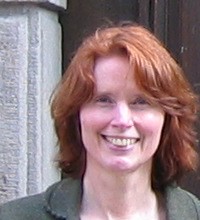You raised the point that in many ways - the writing piece itself will select the audience, so in some sense, writing to an audience can change what you have to say. This line of thinking seems to indicate that "writing to audience" might be a kind of compromise in what writers have to say. At the same time, you also pointed out that writing is about communication, and that it can be important to say things in ways that readers will understand (like filling in enough background) or in ways that readers will be able to hear (like acknowledging their point of view and connecting it to the different point of view in the writing).
You also pointed out that there were different audience considerations for school work and other public writing, for creative writing, and for writing you did for yourselves. You raised lots of important points about this - but at this point I got so involved in listening to you that I stopped taking notes. I think the conflicts between "audience" (especially when audience is mostly teachers) and writers authority over their material and the forms they want to explore present lots of problems in writing classrooms. You pointed out that you wanted to use writing to learn and think - but that often what was "taught" in writing classes (the audience expectations) did not leave room for that = both in terms of the forms and subject matter you were expected to "learn." I noticed these same themes in your literacy narratives - where many of you had two kinds of experiences with writing: good experiences where you used writing for your own purposes; and not always bad - but often frustrating - experiences where you "had' to write in formulaic patterns on content that was not relevant to you. We will think about this some more.
I gave you some general feedback on your literacy narratives - mostly about sharpening your focus and developing your stories so they were fully rendered - as opposed to functioning like voice-overs. Each story should make a particular point to develop your focus. And your focus needs to be idea centered => some observation or generalization about how your identity as a writer connects to or was shaped by the cultural stories we have been talking about.
We also talked about the process narrative = and about creating data for the process narrative. The assignment for next class - the first two chapters in the Elbow book - will move us forward in terms of thinking about writing process and how it works. For now - you are gathering your data.
For next week.
Read: Writing as process: Elbow. Introduction to the second edition; Chapters 1 & 2 (Freewriting, & Growing) => think about this as kind of process narrative.
We will talk about Elbow - explore some of his ideas in terms of your writing - and do some more writing for your process narratives.
Due: Final draft Literacy Narrative
Thanks for the good class today.
Different levels of “freedom” with respect to audience
depending on what kind of writing it is
Writing to audience can
What defines “directness” + what we want to say is kind of shaped by who is going top read
Most of us know who is going to read the paper and how we want them to perceive us =

No comments:
Post a Comment